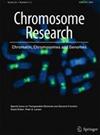The reckoning of chromosomal instability: past, present, future
IF 2.8
4区 生物学
Q3 BIOCHEMISTRY & MOLECULAR BIOLOGY
引用次数: 0
Abstract
Quantitative measures of CIN are crucial to our understanding of its role in cancer. Technological advances have changed the way CIN is quantified, offering increased accuracy and insight. Here, we review measures of CIN through its rise as a field, discuss considerations for its measurement, and look forward to future quantification of CIN.

染色体不稳定性的计算:过去、现在和未来
对 CIN 进行量化测量对我们了解其在癌症中的作用至关重要。技术的进步改变了 CIN 的量化方式,提高了准确性和洞察力。在此,我们回顾了 CIN 作为一个领域的兴起过程中的测量方法,讨论了测量时的注意事项,并展望了未来的 CIN 量化工作。
本文章由计算机程序翻译,如有差异,请以英文原文为准。
求助全文
约1分钟内获得全文
求助全文
来源期刊

Chromosome Research
生物-生化与分子生物学
CiteScore
4.70
自引率
3.80%
发文量
31
审稿时长
1 months
期刊介绍:
Chromosome Research publishes manuscripts from work based on all organisms and encourages submissions in the following areas including, but not limited, to:
· Chromosomes and their linkage to diseases;
· Chromosome organization within the nucleus;
· Chromatin biology (transcription, non-coding RNA, etc);
· Chromosome structure, function and mechanics;
· Chromosome and DNA repair;
· Epigenetic chromosomal functions (centromeres, telomeres, replication, imprinting,
dosage compensation, sex determination, chromosome remodeling);
· Architectural/epigenomic organization of the genome;
· Functional annotation of the genome;
· Functional and comparative genomics in plants and animals;
· Karyology studies that help resolve difficult taxonomic problems or that provide
clues to fundamental mechanisms of genome and karyotype evolution in plants and animals;
· Mitosis and Meiosis;
· Cancer cytogenomics.
 求助内容:
求助内容: 应助结果提醒方式:
应助结果提醒方式:


